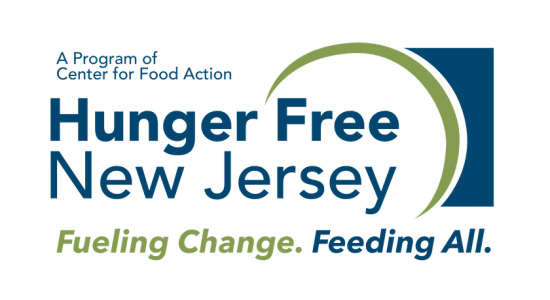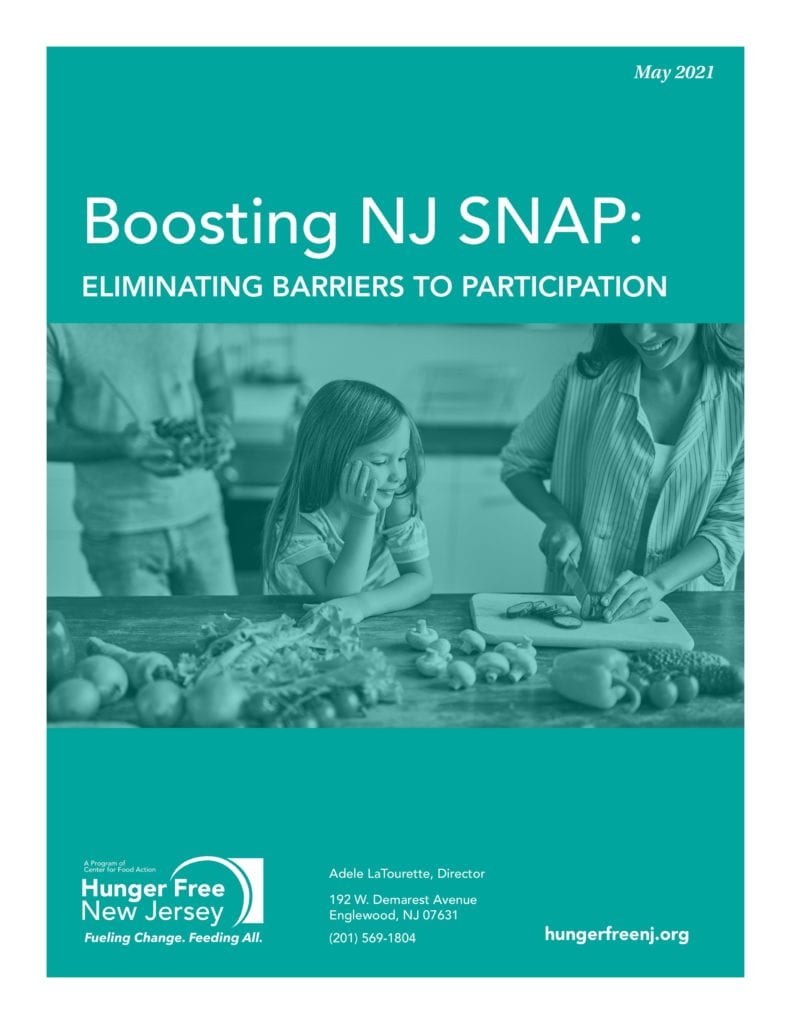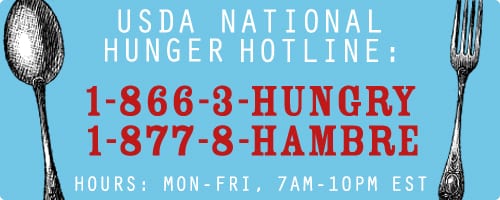NJ SNAP Report 2021
Expanding SNAP Participation in New Jersey
In 2020, Hunger Free New Jersey launched a project to examine barriers to SNAP (food stamps) participation and identify solutions. Working with the Food Research & Action Center and The Food Trust, HFNJ conducted two surveys of SNAP recipients and potential recipients and engaged nearly 90 organizations across NJ to share their experience and expertise. This report details the findings and recommendations that arose from that research.
Read the executive summary.
Read the summary of recommendations.
Distribution Messages
Copy & Paste!
P-EBT Messages
Re: New report provides roadmap for SNAP expansion
A new report from Hunger Free New Jersey provides a roadmap for expanding the reach of the Supplemental Nutrition Assistance Program (SNAP, aka food stamps). Through surveys and meetings with dozens of stakeholders, including (insert your organization’s name), the report finds three key areas for improvement: streamlining the application process, expanding outreach to potentially eligible residents and improving customer service for those receiving SNAP and those potentially eligible.
Hunger Free NJ’s new report provides a roadmap for expanding SNAP’s reach.
Use our graphics posted on this page with your posts!
Hot off the press! Hunger Free NJ’s new report provides a roadmap for expanding SNAP (aka food stamps). Check it out. NJ SNAP Report 2021
More people receiving SNAP, aka food stamps, during the pandemic. Now is the time to build on that expansion so SNAP reaches all NJ residents in need. Read Hunger Free NJ’s report to find out how. NJ SNAP Report 2021
SNAP provides critical food aid to NJ residents. Hunger Free NJ’s new report finds three key ways to boost NJ SNAP’s reach: Streamline the application. Boost SNAP outreach. Improve customer service. Learn more. NJ SNAP Report 2021
NJ SNAP expands to help feed residents during pandemic; now is the time to build on that success.
The number of people receiving food aid through the Supplemental Nutrition Assistance Program (SNAP) expanded 23 percent during the pandemic, helping fight hunger when so many New Jersey residents were struggling to put food on the table.
Now is the time to build on this pandemic-fueled expansion so that this important nutrition support reaches all New Jersey residents who could benefit, says a new report from Hunger Free New Jersey.
While the boost in enrollment – and benefits – during the pandemic is positive, SNAP could still reach more residents in need, the report finds. This critical resource supports the food security, health and economic well-being of hundreds of thousands of New Jersey residents, while also pumping roughly one billion dollars into New Jersey’s local economies each year.
In 2020, Hunger Free New Jersey (HFNJ) launched a statewide project to better understand the barriers to SNAP participation and identify strategies to reach more SNAP-eligible people across the state. HFNJ partnered with the Food Research & Action Center and The Food Trust, with support from the Robert Wood Johnson Foundation, to survey SNAP participants and those likely eligible for SNAP. HFNJ also convened three summits, engaging nearly 90 organizations that work in SNAP-related areas.
The goal was to identify challenges and workable solutions, which are detailed in HFNJ’s new report.
The surveys and stakeholder meetings identified barriers to participation in three key areas:
- An unwieldly and difficult application system,
- Inadequate community outreach to potentially eligible residents,
- Lack of consistent service at county Boards of Social Service offices.
The report makes a series of recommendations in those three areas.
Streamline the application process by:
- Updating the online system to make it user-friendly and employ current technology,
- Editing the application to be clearer and use plain language,
- Simplifying the income verification process,
- Educating community-based organizations about assisting clients in completing online applications and submitting them via telephone, while leveraging community partners’ capacity to offer clients computer access.
Expand community outreach to educate the public about the program and assist more potentially eligible residents in completing the application process, with a focus on college students, older adults, immigrants and the newly unemployed. This should include expanded state funding of additional and more intensive outreach efforts and engaging new partners, such as the healthcare and school systems, in reaching potentially eligible residents.
Examine the level of customer service provided at county Boards of Social Services to identify challenge and solutions at the county level. This should include administering a customer satisfaction survey to identify and address issues in each county and creating a call center where people can access a live person to assist with issues.
Pandemic EBT Improvements
The report also made recommendations for improving the implementation of Pandemic EBT, a child nutrition program that is separate from SNAP and that provides federal dollars to help families buy groceries during the pandemic.
Stakeholders agreed that clarity is needed about P-EBT in previous rollouts. With a new round expected this spring, the New Jersey Department of Human Services should:
- Engage school officials, advocates, child care providers and community organizations to keep them informed of the program rollout and to assist with communicating information to families.
- Establish and adequately staff a toll-free, statewide hotline where people can reach a live person to investigate their case and resolve issues.
Hunger Free New Jersey, and its many partners, will work with state officials and legislative leaders to advance these changes in the coming months.
Apply for SNAP
Many changes have been made to make it easier to apply for SNAP and to receive more money each month to buy food. SNAP recipients can also now shop online. SNAP is one of the most effective anti-hunger programs during good times and bad.



Social Media Graphics
Click to Share!